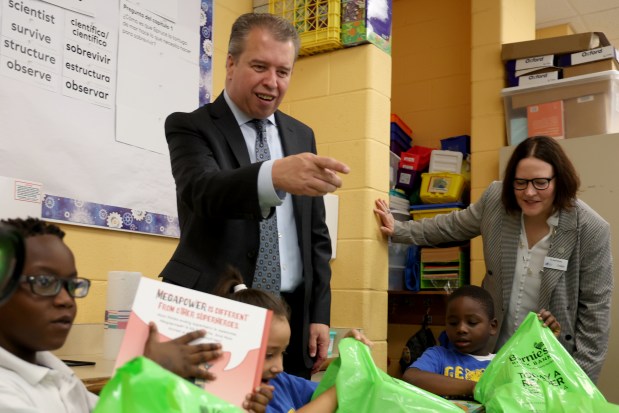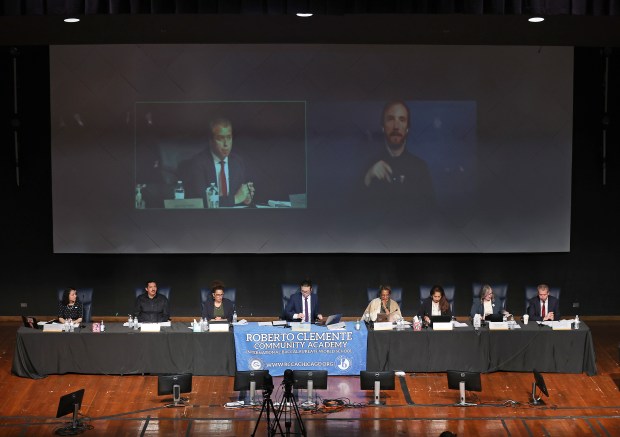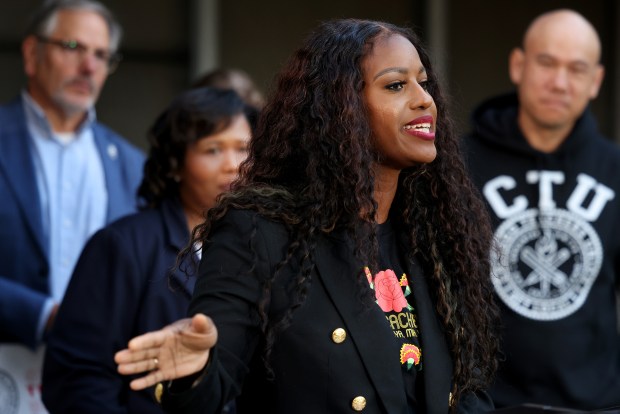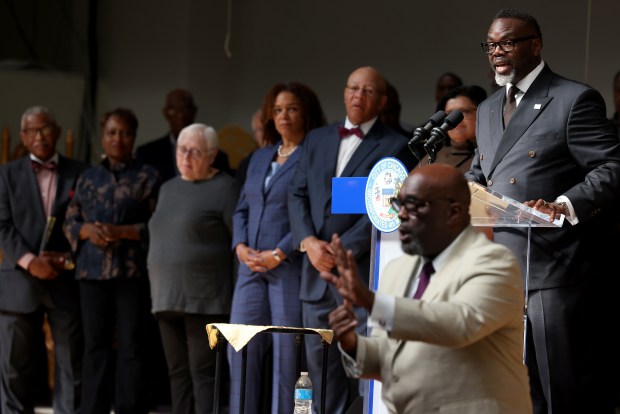It’s been a whirlwind few weeks for public school parents, students and Chicago residents as Mayor Brandon Johnson, Chicago Public Schools Chief Executive Officer Pedro Martinez, the Board of Education and the Chicago Teachers Union engage in an acrimonious back-and-forth on the district’s future and funding.
On Oct. 4, all seven school board members resigned over disagreements about how to address a hefty budget deficit. Three days later, the mayor announced six new appointees to the board at a news conference where he excoriated people who asked questions about his plan.
“They said that it would be fiscally irresponsible for this country to liberate Black people,” he said. “And now you have detractors making the same argument of the Confederacy when it comes to public education in this system.”
The conflict continues weeks before the Nov. 5 general election, in which the voters in the city’s 10 new school districts will choose who will represent them on a new 21-member hybrid school board. Voters will select 10 members, and the mayor will appoint 11, including a new president. The new board will convene in January.
Some background on how this all began:
The root of the CPS back-and-forth is a lack of money.
CPS faced about a $500 million deficit for this school year as federal pandemic relief funding ran out, and is projected to face similar gaps for the next several years.
At the start of Johnson’s administration last year, CPS, the mayor’s office and teachers union presented a united front, joining together to mark the first day of school. Martinez and CTU traveled to Springfield together in the spring to lobby for more state funds for CPS.
Meanwhile, district leaders and the Board of Education appeared to work together on policies favored by both Johnson and CTU, voting to shift focus to neighborhood schools and remove all remaining school resource officers, uniformed police officers responsible for safety at nearly 40 high schools.
But after state lobbying efforts to secure more funding proved unsuccessful, the district began planning for the current school year with a deficit of hundreds of millions dollars. Shortly after, state legislators finalized the Illinois budget with no additional funding for CPS, beyond a mandated annual increase of $350 million to be distributed among districts statewide.
Who are the main players?
Mayor Brandon Johnson, a former CPS teacher, was elected in April 2023. Johnson got his start in politics as a CTU organizer and won the mayoral race after campaigning on a platform of transforming public education. Since his election, the mayor has continued to rely on union support, which is unsurprising since his campaign was mostly bankrolled by major labor groups such as CTU.
Stacy Davis Gates, the president of CTU, taught social studies for over a decade at Englewood, Clemente, and Mason Community Links high schools. She is a staunch believer in organizing and fighting for the rights of CPS students, parents and teachers. In fall 2019, she helped lead a 15-day strike and negotiate a contract. Before she was elected CTU president in 2022, Davis Gates served four years as vice president of the union.
Pedro Martinez was appointed CEO of the district in 2021, previously serving as the district’s chief financial officer for six years. Before joining CPS, Martinez was a superintendent in San Antonio where he received statewide recognition for his hand in making that district the fastest-improving large district in Texas in 2018, 2019, and 2021. Martinez served a brief stint as superintendent in Nevada before he was terminated in 2014 after being accused of deceiving the district about his credentials as a certified public accountant.
How did the Chicago Teachers Union get involved?
The CTU contract expired at the end of June. So this summer, CTU — which is in the middle of contract negotiations — doubled down on its demands and began focusing its ire on Martinez for not having a plan to fully fund schools.
A CPS memo leaked before the district’s July budget vote hinted at the source of growing strife. Johnson had proposed CPS take out a short-term, high-interest $300 million loan to cover the cost of ongoing collective bargaining agreements and a controversial pension payment. The mayor and CTU argued the loan would help avoid midyear layoffs, furloughs or other cuts that could be caused by the new union contract. Martinez said the loan would be fiscally irresponsible.
The Board of Education sided with Martinez and voted unanimously in late July to pass the district’s $9.9 billion spending plan for the 2024-25 school year, without addressing the union’s demands for a loan.
To pass a balanced budget, which the district is required to do by law, CPS cut about $500 million in non-classroom costs and noted, along with Johnson’s office, that a budget amendment would be forthcoming to account for ongoing collective bargaining negotiations with CTU and the principals’ association.
What caused tension to build?

The budget was criticized by both CTU, which balked at end-of-year layoffs of teaching assistants who CPS had guaranteed to pay, and Johnson, who said he would not accept staff cuts and denounced the lack of a $175 million municipal pension payment to cover non-teaching CPS staff.
CPS countered, asserting that the district and city collaborated on developing and finalizing the district’s $9.9 billion budget before it was approved and noting the district’s prior pension contributions were paid for by City Hall, a policy that changed under former Mayor Lori Lightfoot.
But as negotiations continued over the summer, with the last remnants of federal relief funds set to expire, tension grew between the union and Martinez.
CPS said that obliging 52 of the union’s more than 700 contract proposals would produce a projected deficit of $2.9 billion next school year, up from the $509 million deficit already expected. CTU said the district’s analysis sent the wrong message, ignoring the union’s recommendations for additional librarians, arts programming and support for bilingual students.
In late August, CTU said it welcomed CPS’ offer to increase staff wages by 4% to 5% in each of the next four years. But tensions exploded again in late September, when Johnson asked Martinez to step down because of Martinez’s refusal to take on the loan the mayor was asking for to fill the budget gap. Martinez did not resign.
In September, Davis Gates posted on social media that CPS was plotting school closures and planning to fund the staff raises by way of furloughs. Martinez swiftly debunked the claim of planned closures as “misinformation” in a districtwide email to staff, which was followed by a resolution the board passed at its September meeting committing not to close or consolidate schools.
Why did the board resign and what is Martinez’s future?
During his time as CEO of the district, post-pandemic literacy has gone up and Martinez has seen the highest graduation rates for CPS schools to date. Despite that, CTU leaders and Johnson have said they want Martinez out. They have blamed the schools chief for his contribution to the district’s budget deficit during his tenure as CEO.

Earlier this month, when all seven Board of Education members decided to exit rather than give in to the pressure to oust Martinez, they paved the path for Johnson to appoint new board members to follow his request to fire Martinez, make a contract deal with the CTU and take out a loan.
Chicago Board of Education President Jianan Shi, along with members Elizabeth Todd-Breland, Mariela Estrada, Mary Fahey Hughes, Rudy Lozano Jr., Michelle Morales and Tanya Woods informed the mayor’s office of their resignations Oct. 4, and Johnson announced new appointees three days later.
The six appointees are: Olga Bautista, Michilla Blaise, Mary Gardner, the Rev. Mitchell Johnson, Debby Pope and Frank Thomas. Generally, little is known about their previous political backgrounds or leanings, or if they will remove Martinez.
Johnson’s appointees were vetted by his staff, he said, and have to go through another vetting process with CPS before they are officially seated on the board later this month. CPS did not comment on when the vetting process would be finished and the new board seated but said Johnson implied it would likely be before the Board of Education meeting planned for Oct. 24.
Martinez has proposed an alternative plan — to address CPS’ budget gap with TIFs. What does this mean, and how feasible is it?
Following the announced board appointees, Martinez and the CTU have both proposed an alternative plan to solve the district’s financial woes: tax increment financing. TIFs are investments from local taxing bodies to aid in development projects, primarily for underperforming areas, and the city decides how much extra TIF money to sweep into the city budget, dubbed the “TIF surplus.”
While CTU leaders called for a sped-up, near-total end to TIF districts that would face daunting political hurdles to give the district an estimated annual payout of $1 billion, Martinez said he asked Johnson in April for a partial TIF sweep.
Martinez said he asked the mayor for a sweep sufficient to provide CPS with at least $452 million this year. The sum would require Johnson to declare a record surplus of nearly $1 billion.
Johnson’s 2024 budget included a $433.8 million TIF surplus. Of that, CPS received $226 million.
Johnson has not detailed the TIF surplus planned for 2025, and the city typically uses TIF surplus revenue to plug its own budget gaps. Johnson is staring down a nearly $1 billion deficit in next year’s budget.
What does this mean for the November school board election?

With less than a month until the Nov. 5 election, the race for 10 seats on Chicago’s new hybrid school board is heating up and campaign donations have soared in the past month. Interested parties are likely to continue spending big in hopes of shaping Chicago Public Schools’ future.
The Chicago Teachers Union, by far the biggest contributor, gave $372,000 in the past week alone to its slate of endorsed candidates, mostly through in-kind donations, according to records from the Illinois State Board of Elections.
In that same span, super PACs affiliated with school choice groups — the Illinois Network of Charter Schools and the Urban Center — are also spending big, logging $274,000 in spending in support of candidates in the past week, per state records.
There is still a lot that remains uncertain: whether CTU will go on strike next year if their contract demands aren’t met, if there are plans to do a national search for a new CEO and how all of this will impact CPS teaching and student learning.
City Council will hold a special meeting on the controversy on Wednesday, Oct. 16. They tried last week, calling on the current and future board members to appear for questioning. Not a single board member showed up.



